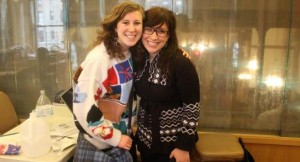By: Estee Ellis, OU-JLIC student at University of Pennsylvania
 I emerged from the subway on 86th street, checking my phone for the address of the Jewish Center. A young woman walked by, looked over her shoulder and slowed down. “OU-JLIC Beit Midrash?” She guessed. I laughed at her accuracy, and together we found our way to 131 West 86th street simvastatin medication. It was the first day at the OU-JLIC Beit Midrash Winter Learning Program.
I emerged from the subway on 86th street, checking my phone for the address of the Jewish Center. A young woman walked by, looked over her shoulder and slowed down. “OU-JLIC Beit Midrash?” She guessed. I laughed at her accuracy, and together we found our way to 131 West 86th street simvastatin medication. It was the first day at the OU-JLIC Beit Midrash Winter Learning Program.
Once we arrived and settled in, Rabbi Menachem Schrader introduced the week of learning that would explore the theme: “ The Jewish Community and the Broader World.” Shiurim and lectures followed, delivered by Torah educators such as Rabbi Shalom Carmy (Yeshiva University), Rabbi Daniel Fridman (The Jewish Center, NY), Rabbi Gideon Black (OU-JLIC NYU), Rabbi and Rebbetzin Taubes (OU-JLIC UPenn), Rabbi and Rebbetzin Pardo (OU-JLIC Brandeis), and Rabbi Mark Gottlieb (Tikvah) –to name a few. Each day was filled with lecture and chavruta time, offering a comprehensive study of the topics. We explored Halachic applications like Kashrut and interfaith exchanges, as well as Hashkafic discussions like responses to Bible Criticism and the concept of “chosen-ness.” All the while it was evident that this program was uniquely designed for Jewish college students. The Shiurim and discussions addressed relevant intellectual and real-life situations we might face in our lives.
Everyday from 9:30am-4:30pm we met to learn, build friendships, ask questions, and share experiences. A night activity with Hart Levine highlighted our positions as college students. Hart challenged us to consider the positive impact we could make by reaching out in our respective Jewish communities on campus.
Being a part of the OU-JLIC Winter Beit Midrash Program became an important part of my Jewish education. As a day school student, and then American gap-year student in Israel, I had grown used to being on the receiving end of Torah knowledge. Transitioning to college meant rethinking my relationship with Torah education. I’ve discovered that shiurim can be peer-led and student driven. Within the Orthodox community at Penn, I’ve become more actively involved in many aspects of my religious life—checking the Eruv, giving Divrei Torah, and managing student mashgiach shifts in the kitchen as a Head Mashgiach. In other contexts as well, I find myself on the transmitting end of my tradition—notifying professors that I won’t be in class on Holidays, informing my friends that I eat in the Kosher dining hall, or telling my TA what a Lulav and Etrog is (which he mistook for a flower).
At times this is a daunting task. Balancing personal religious development with worldly pursuits is not immediately easy in this environment. But as Rabbi Menachem Schrader reminded us, a significant focus of the week of learning was aimed to reframe the dichotomy between the “religious” and the “purely academic”—to instead see the various opportunities for Kavod HaShem (Glory of G-d) and Avodat HaShem (Service of G-d) all around us.
The opportunity to learn in the OU-JLIC Beit Midrash Program has helped bridge these experiences for me—bridging the two worlds in which I live, and bridging together my identities as a student and active participant. It was an opportunity to advocate for my Jewish education, and join a community of students similarly eager to learn.
I found the learning program to be an incredibly rewarding experience. I gained Torah insights, new friends, and a deeper understanding of my role in the Jewish community and the broader world. As Rabbi Menachem Schrader said in his closing remarks, our ability to actively engage in the Beit Midrash and the world around us will be an essential part of us–for the duration of our lives.